Performing Arts

Women in Israeli Cinema
For many years, women played a secondary role in Israeli cinema, with little voice of their own and limited largely to objects of the male gaze. More recently, women filmmakers, often emphasizing autobiographical narratives, have begun to critique the patriarchal family and present new perceptions of female sexuality and female social roles.
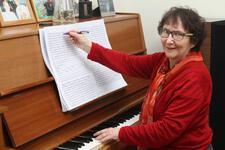
Women in Israeli Music
The arrival in pre- and post-state Israel of Jewish immigrants from Europe, the Middle East, and North Africa resulted in a culturally diverse proliferation of music, much of which involved performance and composition by Jewish women. Jewish women have also contributed significantly to the development of music education and music scholarship, being involved in music studies publications and projects as well as the development of music education institutions.
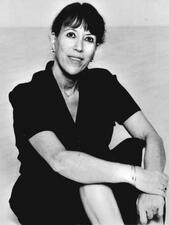
Berta Yampolsky
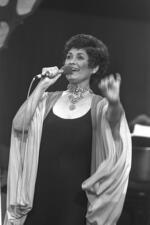
Yaffa Yarkoni
Yaffa Yarkoni was a talented and influential Israeli singer who recorded over 1,400 songs throughout her career. Known for her deep and throaty voice, her music spanned an impressive array of styles and rhythms and marked a shift in Israeli popular music.
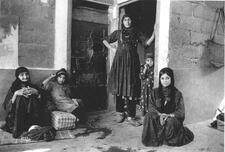
Yemenite Women in Israel: 1948 to 2005
The transition of Yemenite women from a traditional religious society to a western-secular society upon immigration to Israel was marked by a certain ambivalence. Their status and gender roles changed, and they became integrated both economically and socially into Israeli society. However, the new values underwent a certain degree of filtration as Yemenite women accepted some elements while rejecting others.
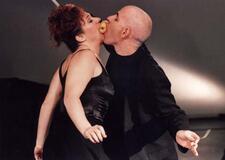
Rina Yerushalmi
Theater director and choreographer Rina Yerushalmi, one of Israel’s leading artists, is the founder and artistic director of the experimental Itim Theater Ensemble. Her unique theatrical language is based on visual images that present the classical texts in a new light, making them acute and relevant. Yerushalmi currently serves as Professor of Theater at Tel Aviv University.
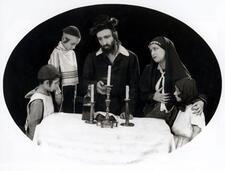
Yiddish Film in the United States
American Yiddish films captured the language, lifestyle, values, dreams, and myths of Yiddish culture, which resonated deeply with many Yiddish immigrant communities in New York City. Yiddish film reached its “Golden Age” between 1936 and 1939, and many influential women graced the Yiddish screen, including Moly Pico, Celia Adler, Jennie Goldstein, Lili Liliana, and Berta Gersten.
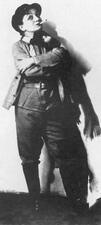
Yiddish Musical Theater in the United States
Jewish women on stage in America took on a variety of musical roles and performed all kinds of songs, including religious hymns and liturgical chants. In its heyday, the Yiddish stage mirrored American Jewish life. An amazing range of women’s woes were highlighted, discussed, and often resolved across the footlights, presenting the reality that immigrant women faced to an extent not paralleled in the English-language theatrical world during those years.
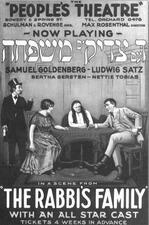
Yiddish Theater in the United States
Women have always been important as both Yiddish theater audiences and actors. For a decade and more, most American Yiddish actors were immigrants, as were their audiences. Often families played in the same company, such as the famous Adler family. Now, as Yiddish theater has become attenuated, the loyalties and memories of women are important for its survival.
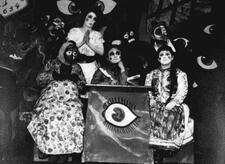
Yiddish Theater in Vienna
Jewish theater in Vienna between 1900 and 1938 is inconceivable without women actors. A total of 112 people were active in the Viennese Yiddish theaters, of whom 37 were women. Actors such as Pepi Litmann, Molly Picon, and Mina Deutsch popularized “trouser roles” in which women depicted men as well as playing strongly typified female characters.
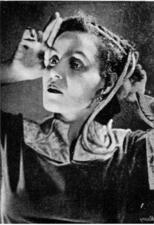
Brachah Zefira
Brachah Zefira was a seminal figure in the world of Israeli song and among its most colorful and influential personalities in the pre-State period. She toured the world performing with her husband, pianist Nahum Nardi, and the duo played an influential role in ethnic integration in Palestine. In Zefira’s footsteps, an entire wave of Yemenite women singers arose.
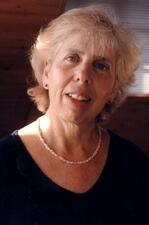
Ruth Ziv-Ayal
Ruth Ziv-Ayal, a director and choreographer, is a pioneer in Israeli experimental movement theater. Her early work was characterized by the use of everyday materials such as household tools, newspapers, and balls, while her later work expanded to use materials such as soil, sand, water, bread, and clothing.
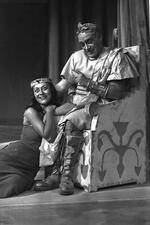
Miriam Zohar
Miriam Zohar is known as one of the leading ladies of Israeli theater, performing as a lead at the Habimah theater from 1951 until 1994. After a tumultuous war-torn childhood and immigration journey from Ukraine to Israel, Zohar rose to fame working under director Hy Kalus and won an Israel Prize for her noteworthy performances.



